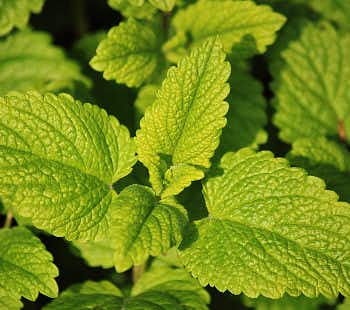
Lemon balm (Melissa officinalis) is originally a native of the Mediterranean area and western Asia, but it has long been popular in Western Europe, including England.
It is frequently used as an attractive edible garnish, and it can be made into tea. The leaves give off a delightful lemony aroma when they are crushed or torn before the flowers appear, but the taste and odor are altered after flowering.
Lemon balm, which has also been referred to as bee balm, sweet balm, or common balm, is used as a remedy for mild insomnia or for digestive discomfort and gas. It has traditionally been used in herbal mixtures to disguise less pleasant tastes and smells. This may have given Melissa officinalis something of a reputation as a cure-all.
The leaves, picked before flowering, are the part of the plant that is used. A cream containing lemon balm extract is used to treat cold sores topically.
Active Ingredients of Lemon Balm
The leaves of lemon balm contain a relatively small, but variable, amount of essential oil. Agricultural researchers in New Zealand grew plants with approximately 0.02 percent essential oil. Lemon balm grown in Spain contains up to 0.8 percent essential oil. The European standard calls for at least 0.05 percent essential oil.
The composition of the oil itself is complex, with more than seventy ingredients. Notable constituents include citronellal, geranial (citral a), and neral (citral b), which together offer most of the characteristic aroma.
Other components include flavonoids, especially apigenin, kaempferol, luteolin, and quercetin. Rosmarinic acid constitutes between 4 and 5 percent of lemon balm leaves, and there are small amounts of caffeic and chlorogenic acids. Triterpene compounds include ursolic and oleanolic acids.
Uses of Lemon Balm
Lemon balm is taken internally (usually as a tea or infusion) primarily for relaxation. Thus, The PDR for Herbal Medicines declares it is used for “nervous agitation, sleeping problems, and functional gastrointestinal complaints with meteorism” [flatulence]. “Functional” problems are those attributed in part to psychological factors such as stress.
It is known to stimulate the production of bile.
A lemon balm extract injected into mice had sedative properties in tests. Very low doses of the extract in combination with a dose of barbiturate too low to sedate a mouse resulted in sleep.
Lemon balm also extended the amount of time mice slept after being given a barbiturate. At high doses, the extract had a pain relieving effect. In the test tube, lemon balm extract is active against herpes simplex virus, influenza viruses, Newcastle disease, and several other viruses. It also appears to act as an antioxidant and free radical scavenger. These research results help support the folk use of lemon balm against colds and its modern use against cold sores.
A double-blind clinical trial showed that a 1 percent melissa cream was effective for the topical treatment of cold sores, significantly reducing the size within five days.
Test tube studies also demonstrated that the essential oil can prevent or reverse smooth muscle spasm such as guinea pig ileum or rabbit aorta. This would make it useful for treating stomach cramps or menstrual pain. Rosmarinic acid inhibits inflammation both in the test tube and in rat-paw tests.
Lemon balm lowers TSH levels in animals and has been used to treat Graves’ disease (a condition in which the thyroid gland becomes hyperactive). Rosmarinic acid in lemon balm apparently binds to thyrotropin (TSH) and keeps it from connecting with the gland. This action is relatively weak, however.
Dose
The tea is made by pouring 1 cup of hot water over 2 g (about 2 teaspoons) of dried leaf, steeping five to ten minutes, and straining. Two to three cups daily are usually consumed, and there is no limit on the duration of treatment.
For topical use, a 1 percent cream is applied to the spot from the first tingling hint of a cold sore until it heals, not more than two weeks.
Special Precautions
No studies have established the safety of lemon balm tea or extract for pregnant women and nursing mothers. Because of its antithyroid activity, it is not recommended. People with thyroid conditions should use lemon balm only under medical supervision.
Adverse Effects
No side effects are reported in the literature.
Possible Interactions
Because of the animal research showing that lemon balm extract can potentiate barbiturate action, the herb should be used only with caution, if at all, in combination with sedatives such as Ambien or benzodiazepines as well as barbiturates such as Fiorinal.

